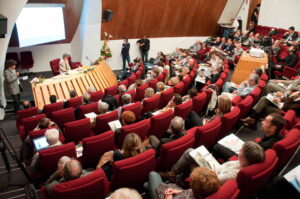PhD defense :
Gut microbiota regulation of enteroendocrine cells along the gut: towards a role for cell metabolism
Enteroendocrine cells (EECs) are essential components of the intestinal epithelium, responsible for the production of hormones that regulate energy metabolism, satiety, digestion, and intestinal transit, among other functions. These hormones are secreted in response to various stimuli, especially nutritional and microbial signals, and thereby enable an appropriate response to food intake or changes in microbiota activity. The gut microbiota encompasses all the microorganisms present in the intestine, mostly bacteria, that interact with the host by contributing to nutrient extraction, providing energy substrates to host cells, and modulating metabolic activity, intestinal barrier function, and immunity. EECs express a multitude of receptors, making them particularly sensitive to the gut microbiota and its metabolites. The close relationship between gut microbiota and gut hormones is illustrated by altered circulating hormone levels, such as GLP-1, in germ-free or antibiotic-treated animals. Moreover, different EEC subpopulations are distributed along the intestinal tract, allowing for region-specific responses to environmental changes.
This thesis aims to better understand how the functions of the different EEC subpopulations are regulated. Specifically, the objective of this study was to understand how, in the absence of disease, the gut microbiota modulates EECs and their production of intestinal hormones. In addition to exploring different intestinal regions, I also studied the kinetics of EECs adaptation to changes in the microbial environment and analyzed potential sex-based differences in EECs responses.
To investigate the regulation of EECs activity by the gut microbiota, the microbiota of mice was depleted using a broad-spectrum antibiotic treatment. The levels of expression of genes coding for gut hormones were measured at various time points post-depletion and in different intestinal regions. The use of genetically modified mice expressing a fluorescent protein specifically in EECs allowed for the sorting of these cells and the study of their specific responses compared to the rest of the epithelium.
Through this work, I demonstrated that the absence of gut microbiota led to transcriptional adaptations in EECs, which produced higher levels of several gut hormones in a region-specific manner. Furthermore, the transcriptional responses of sorted EECs differed from those of the overall intestinal epithelium, indicating that EECs responded to the gut microbiota in a specific manner. KEGG pathway analysis revealed that metabolic pathways were particularly affected in EECs in the absence of microbiota. Enzymatic activity assays and metabolic modulation experiments using organoid models supported the hypothesis that the metabolic remodeling of EECs contributes to the alteration of their functions by the gut microbiota.
These findings highlight a strong regional specificity in how the gut microbiota functionally modulates EECs. This heterogeneous EEC response may be attributed to local environmental factors or endogenous mechanisms, such as epigenetic regulation. Additionally, changes in the microbial environment differentially affect the activity of various EEC subtypes. This specificity opens up therapeutic perspectives. For instance, the production of certain intestinal hormones could be targeted through microbiota-sensitive pathways, particularly in the context of metabolic diseases such as diabetes. Finally, the functional activity of EECs appears to be intrinsically linked to their cellular metabolism, which arises as a key lever in the regulation of enteroendocrine activity.
Jury members:
- Johanne LE BEYEC – LE BIHAN, MCU-PH (HDR), Sorbonne Université (rapporteur)
- Sophie LESTAVEL, Professeure, Université de Lille (rapporteur)
- Béatrice MORIO, Directrice de recherche, INRAE (Université de Lyon 1) (examinatrice)
- Martin BEAUMONT, Chargé de recherche, INRAE (INPT) (examinateur)
- Patricia SERRADAS, Professeure, Sorbonne Université (examinatrice)
Directed by:
Pierre LARRAUFIE (Researcher, Micalis Institute, INRAE, FInE team).




